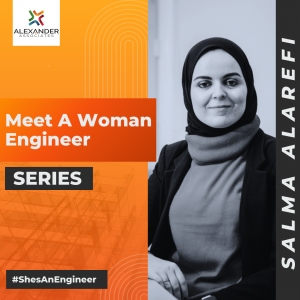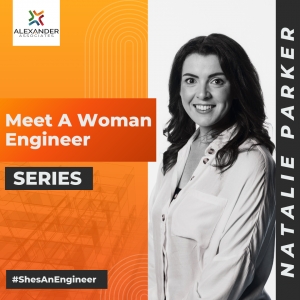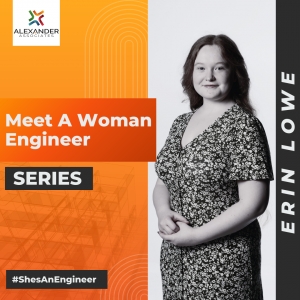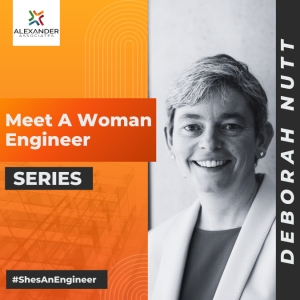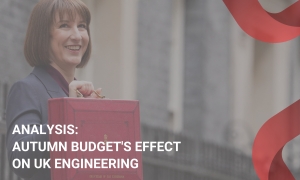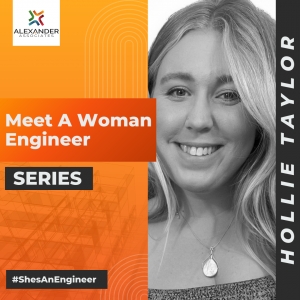Alexander Associates
In today’s rapidly evolving world, the need for diversity in engineering is more critical than ever. Yet, despite efforts to promote inclusivity, women remain underrepresented in engineering roles. The percentage of female engineers in the workforce remains disproportionately low compared to their male counterparts. In the UK, for example, only 16% of engineers are women, according to a 2023 report by the Women’s Engineering Society (WES). This gap not only limits the potential of engineering firms but also hinders innovation and diversity of thought.
As companies strive to meet growing talent demands, attracting and retaining female engineering talent has become a strategic priority. A gender-diverse workforce is proven to enhance creativity, improve problem-solving, and increase overall productivity. Here, we explore key strategies engineering companies can use to attract and retain female talent, drawing from insights found in research and industry best practices.
1. Create a Women-Friendly Work Environment
The foundation of attracting and retaining female engineering talent starts with cultivating a work environment that is welcoming and inclusive. Many women face unique challenges in male-dominated fields, from subtle biases to lack of mentorship opportunities. Engineering companies can address these challenges by fostering a culture that values diversity and inclusion.
Flexible Work Options: Flexibility in work schedules or the option to work remotely is crucial for women balancing professional and personal commitments. Research from McKinsey & Company indicates that women are more likely than men to face challenges with work-life balance, particularly when juggling family responsibilities. Engineering firms that offer flexible work arrangements and supportive parental leave policies make themselves more attractive to female candidates.
Zero Tolerance for Bias: Addressing unconscious bias in hiring and promotions is another vital step in creating an inclusive environment. Companies should provide unconscious bias training for all employees involved in recruitment and decision-making. This helps ensure that hiring processes are fair and that female candidates are given equal opportunities for advancement.
2. Provide Mentorship and Career Development Opportunities
One of the primary reasons why women leave engineering fields is the lack of career progression and mentorship opportunities. According to a study by the National Girls Collaborative Project, 40% of women in STEM report not having access to a mentor, compared to 30% of men. To retain female engineers, companies must invest in robust mentorship programs and career development initiatives.
Formal Mentorship Programs: Establishing structured mentorship programs that pair female engineers with senior leaders can provide the guidance and support needed to navigate the challenges of the industry. These programs help women build confidence, expand their professional networks, and gain valuable advice from those who have faced similar challenges. Here are some valuable mentoring programs to explore:
Society of Women Engineers - https://swe.org/membership/mentoring/
Women’s Engineering Society - https://www.wes.org.uk/mentorset/
The Institution of Engineering & Technology - https://www.theiet.org/career/professional-development/mentoring
Royal Academy of Engineering - https://raeng.org.uk/access-mentoring
Leadership Development: Providing leadership development programs for female engineers can also increase retention. These programs can equip women with the skills needed for higher-level positions, ensuring they have a clear path to advancement within the organisation.
3. Highlight Successful Female Role Models
Visibility of successful female engineers within an organisation is key to inspiring the next generation of talent. Companies should actively highlight the achievements of female engineers, both within the company and across the broader engineering community.
Showcase Success Stories: Sharing success stories through internal newsletters, social media, and at company events can serve as a powerful tool for motivating women in the workplace. When female engineers see others in leadership positions, they are more likely to believe that they, too, can succeed.
Encourage Employees to Apply for Engineering Awards: Companies should actively support and encourage women within their organisation to apply for prestigious award ceremonies, showcasing their achievements. This not only benefits the individuals but also enhances the company's employer brand, attracting more female engineers by highlighting a commitment to an inclusive and supportive work environment.
Support Women in Leadership: Companies should ensure that women are represented in leadership roles and on boards. According to a study by the Peterson Institute for International Economics, companies with more women in leadership positions tend to have better financial performance. This not only benefits the company’s bottom line but also sends a message to female engineers that their potential for leadership is recognised and valued.
4. Foster a Culture of Inclusivity
It’s essential to create an organisational culture that promotes respect, collaboration, and inclusivity for all employees, regardless of gender. An inclusive culture helps ensure that female engineers feel valued and supported in their work environment.
Promote Collaboration Over Competition: Companies can combat the “boys’ club” mentality by encouraging a collaborative approach to problem-solving, where all voices are heard and respected. A more inclusive work culture enables women to contribute freely without fear of being overshadowed by their male colleagues.
Support Networks and Employee Resource Groups (ERGs): Establishing ERGs for women in engineering can provide a safe space for employees to share experiences, offer advice, and support one another. These groups can also act as an advisory body for leadership, helping the company identify and address potential gender-related challenges in the workplace.
5. Address Gender Pay Gap and Equal Opportunities
Equal pay for equal work remains a crucial issue for women in many fields, including engineering. According to the WES, women in engineering earn, on average, 10% less than their male counterparts. Addressing this pay gap is essential for attracting and retaining female talent.
Conduct Regular Pay Audits: Engineering companies should regularly conduct pay audits to ensure that there is no pay disparity between male and female engineers performing the same roles. Transparent salary structures can also help attract more female talent, as candidates are more likely to trust organisations that are committed to fair compensation.
Equal Opportunities for Advancement: To retain women in engineering, companies must ensure that all employees, regardless of gender, have equal opportunities for promotion and advancement. This includes providing fair and unbiased performance reviews and ensuring that women have access to high-impact projects that can accelerate their career growth.
6. Partner with Educational Institutions
A long-term strategy to encourage more women to pursue engineering is to engage with educational institutions, especially during the early stages of their careers. While some larger engineering companies and organisations, such as EngineeringUK, IET, and EqualEngineers, are already involved in these efforts, there is certainly room for more companies to take part.
Support STEM Education for Girls: Companies can collaborate with schools and universities to encourage young girls to pursue STEM (Science, Technology, Engineering, and Math) subjects. Programs such as internships, scholarships, and outreach initiatives can help create a pipeline of future female engineers.
Internship and Apprenticeship Opportunities: Offering internships and apprenticeships specifically for women can provide them with hands-on experience in the field and encourage them to pursue a full-time career in engineering.
Conclusion
Attracting and retaining female engineering talent requires a holistic approach that involves creating an inclusive work culture, providing mentorship, offering equal opportunities for career advancement, and addressing systemic barriers such as the gender pay gap. By investing in these strategies, engineering companies not only contribute to a more equitable industry but also unlock the full potential of their workforce, driving innovation and success in the process.
Incorporating these best practices into your company’s culture could be the key to not only attracting more female engineers but also ensuring that they thrive and remain committed to their careers long-term.
Looking to Attract and Retain Top Female Engineering Talent?
At Alexander Associates, we are dedicated to helping companies attract and retain top female engineering talent. Through our #SheIsAnEngineer campaign, we actively promote and support women in engineering roles, fostering a more inclusive industry.
As proud sponsors of the SheCanEngineer initiative, we are committed to empowering women in engineering and helping companies build diverse, high-performing teams.
Reach out to us today to see how we can assist in meeting your recruitment needs and creating a more diverse workforce.
Contact us: Recruit@alexander-assoc.co.uk / 01959 562 572
Sources:
- Women’s Engineering Society (WES), 2023
- McKinsey & Company, “Women in the Workplace 2022”
- National Girls Collaborative Project
- Peterson Institute for International Economics
Why You Should Consider a Career in Space
When we hear the word "space," our minds often leap to images of astronauts, rocket launches, or distant planets. But the space industry is much more than exploration—it’s a dynamic, rapidly growing field that directly impacts life on Earth. From improving global communication to addressing climate change, space technologies have become integral to solving the challenges we face every day.
This blog delves into why a career in space is not just exciting but also profoundly meaningful, and how you can become a part of this groundbreaking industry.
Skyrocketing Demand for Talent
The UK's space sector is rapidly expanding, globally competitive, and plays a vital role in the economy, national security, and daily life. The industry has demonstrated remarkable resilience, with sector income growing by 5.1% during 2020-2021 despite ongoing macroeconomic challenges (Size and Health of the UK Space Industry 2022).
Valued at over £16.4 billion annually, the sector supports 45,100 jobs and offers exciting opportunities across diverse areas of space innovation and development. The UK has emerged as a major hub for space investment, boasting key centres of innovation and activity. In England, regions like Oxfordshire and Cornwall lead the charge, while Scotland is home to thriving hubs in Cumbernauld, Glasgow, and the Highlands, among others.
Gone are the days when space was solely the domain of government agencies and aerospace giants. The rise of private companies like SpaceX, Blue Origin, and Rocket Lab has revolutionised the industry, opening doors for professionals across disciplines.
Whether you’re an engineer, a business strategist, a lawyer, or an artist, the space sector needs your skills.
The industry now offers diverse roles in:
- STEM: Engineering, computer science, astrophysics, and robotics.
- Business and Marketing: Supporting the commercialisation of space services.
- Law and Policy: Addressing issues like space tourism, resource mining, and satellite regulation.
- Creative Fields: Communicating space missions to the public through storytelling, design, and media.
Space Technologies Improve Life on Earth
The extreme environment of space pushes the boundaries of innovation. Many of these advancements, designed for use beyond our planet, find practical applications here on Earth.
- Communication Revolution: Satellites power the internet, television, and mobile networks, connecting the world like never before.
- Navigation and Safety: GPS technology enables seamless navigation, efficient logistics, and disaster management.
- Scientific Breakthroughs: Research conducted in microgravity aboard the International Space Station (ISS) deepens our understanding of the human body, aiding advancements in healthcare and aging research.
- Environmental Monitoring: Earth observation satellites track climate patterns, monitor natural disasters, and provide essential data for agriculture and urban planning.
Space technologies don’t just explore—they help solve real-world problems, making them indispensable in addressing global challenges.
No Space Experience? No Problem!
The space sector is facing a skills gap, as its rapid growth is outpacing the availability of qualified talent. According to the 2023 Space Sector Skills Survey, 52% of organisations in the UK space sector reported skills gaps in their workforce.
There is also a strong demand for individuals starting their careers in the space sector. The Space Skills Alliance recently analysed 812 job postings from the UK’s early-career space industry to identify the most sought-after skills. The analysis revealed that software development is the top technical skill, appearing in 49% of job listings. In particular, proficiency in C/C++ (22%) and Python (20%) is highly valued. This underscores that the space sector's skills shortage is primarily driven by a lack of tech expertise, highlighting the need for programming skills to be a central focus of the sector's skills strategy.
Moreover, employers are increasingly seeking transferable skills, with interpersonal skills required by 84% of employers and communication skills by 76%.
However, Alexander Associates has been collaborating with space companies to address this challenge by recruiting engineers from our network, with expertise in the automotive, defence, aerospace, and aviation sectors.
Pioneering Technology and Innovation
Engineers working in space-related industries have the chance to work with the latest and most advanced technologies. Space exploration pushes the boundaries of what’s possible in areas like materials science, robotics, artificial intelligence, and energy generation.
Here are some of the latest innovations from UK-based private companies:
- Space Solar: A company focused on space-based solar power (SBSP) to deliver clean, affordable energy. Its £624 million satellite could soon provide power to 3,000 homes from space.
- Skyrora: A Scotland-based company aiming to launch its first suborbital mission from British soil in the spring.
- Orbit Fab: A company working on "cosmic petrol stations" designed to extend satellite lifespans and enable deeper space missions. The company plans to be operational in space by 2027.
Engineers in this field are at the forefront of developing and implementing these groundbreaking innovations, contributing to advancements that often have applications beyond space exploration.
Kickstart Your Career in Space
Interested in exploring career opportunities in the space sector? Connect with our expert recruitment team for an introductory chat about how you can leverage your skills and secure a role with one of our leading space clients across the UK.
Contact:
Peter Webb: peter.webb@alexander-assoc.co.uk | 01959 562 572
Aimee Hall: aimee.hall@alexander-assoc.co.uk | 01959 562 572
MEET A WOMAN ENGINEER - ALENA IQBAL
Name: Alena Iqbal Meng (Hons)
Job Title: Project Manager – Digital Transformation
Location: Manchester
Alena Iqbal is a Project Manager at Amey. Alena's journey into engineering began at the age of 16 during a work experience at an engineering consultancy. While her peers spent their 1-week work experience photocopying documents, Alena had the opportunity to size a nitric acid tank, which sparked her passion for problem-solving and understanding chemical properties. The supportive and inspiring project manager she worked with played a key role in her decision to pursue engineering, leading her to study Chemical and Process Engineering at the University of Leeds.
Today, Alena thrives in her role, where every day brings new challenges. As a Project Manager she leads digitalisation projects, most recently working on a project to digitalise the planning process of Amey’s construction teams.
As a woman of colour in a traditionally male-dominated field, Alena has faced numerous challenges, yet she has always persevered. A leadership program with Amey helped her overcome imposter syndrome, boosting her confidence and fuelling her advocacy for more women of colour in senior roles within the rail industry. Inspired by the mentorship she received from two female graduates early in her career, Alena is now a passionate mentor herself, dedicated to creating more opportunities for women and paying it forward by coaching and guiding the next generation of engineers.
Today, we explore Alena's journey, as she shares her career path and encourages young girls to pursue their passions in engineering with confidence and without hesitation.
When did you realise that a career in engineering was right for you? Was there a particular moment in your life?
When I was 16, I did a 1-week work experience at an engineering consultancy which inspired me to become an engineer. While my friends spent their 1-week work experience photocopying documents, the PM looking after me had different plans! By the end of the week, I had sized a nitric acid tank. I enjoyed the problem-solving and the learning that came with it, such as calculations and understanding chemical properties. However, it was the team that made this experience truly memorable. I was especially inspired by the PM’s passion for all things engineering, and as a result, I decided to study engineering at university.
What does an average day look like for you?
It varies as I like to get involved in different projects and initiatives. I have weekly catchups with project teams to identify any issues with our digital processes and work towards resolving these. For processes that need fine tuning, I have a detail-oriented approach. The overarching theme is collaborative problem solving as I rely heavily on the expertise of some incredibly talented individuals. I’ve recently worked on a project to digitalise the planning process our construction teams use which has been challenging yet rewarding.
How did you get into this career? What qualifications did you get?
I was looking for a project management graduate scheme and this role seemed like a good fit. Due to the scale of the project and me being on a graduate scheme, I was able to try my hand at several roles which helped me hone in on what I enjoy: Process Optimisation! I graduated from the University of Leeds with a Masters in Chemical and Process engineering (MEng) which has been handy when working on processes in rail!
Did you face any challenges with your career decision as a woman engineer?
I’m a big believer in “If you can see her, you can be her” and I very much did not “see her” when I started, especially in senior roles. Initially, I felt like I didn’t belong in any room I walked into, and I’m sure this reflected in my behaviour as I questioned “Am I supposed to be here?”.
I completed a leadership programme with Amey specifically aimed at individuals from multicultural backgrounds. This programme, along with the mentoring l received, empowered me and helped me overcome my doubts. The rail industry has been championing gender diversity massively which is really promising. However, women of colour are still very much missing, especially in senior management; I’m expecting this to change soon.
What advice would you give to young girls considering a career in engineering?
Pursue your interests to the ends of the earth, whatever they may be. Don’t let society dictate where you do or don’t belong, and don’t self-reject! Operating from a place of abundance will yield far greater results than operating from a place of scarcity - build each other up. This mindset has greatly helped me in my career; where others have seen obstacles, I’ve seen opportunities.
Do you have any standout memories from your career as an engineer?
I do! During my 1-week work experience (mentioned earlier), two female graduates took me under their wing. I returned to that same engineering consultancy for work placements over the next few summers, and being around these women had a profound impact on me. Their genuine mutual respect and the care they showed me have stayed with me. In male-dominated fields, women can feel like they are fighting for one seat at the table; these women taught me the importance of creating more seats at the table. This experience is a driving force for the coaching and mentoring I do with early career professionals in my own industry. I believe it’s my responsibility to pay it forward.
Curious about our #ShesAnEngineer series? Dive into our video series featuring women who are driving change and breaking down barriers in their field. Discover their inspiring stories here: https://www.alexander-assoc.co.uk/women-in-engineering.
MEET A WOMAN ENGINEER - SALMA ALAREFI
Salma Alarefi is a Lecturer in Engineering Education at the University of Leeds, where she teaches and supports the development of future engineers. Her expertise focuses on renewable energy systems, and she delivers lectures, laboratory sessions, and supervises students' technical projects.
Salma developed an interest in engineering during school, where she felt most comfortable in maths and physics classes. As a person who stammers, she enjoyed problem-solving activities that allowed for minimal verbal interaction. The satisfaction she gained from solving problems boosted her confidence in choosing engineering as a career. Inspired by her maths teacher, who demonstrated how math applies to everyday life, Salma became passionate about STEM, seeing it as a way to make a meaningful impact while staying within her comfort zone.
Today, Salma balances teaching, tutoring, project supervision, and research in engineering education. She holds a PhD and is a Fellow of the Higher Education Academy.
As a finalist for the IET Young Woman Engineer of the Year 2024, Salma is a passionate advocate for young girls in engineering. Having faced challenges as a woman in the field, she now uses these experiences as motivation to push forward.
Today, we dive into her story, exploring the experiences and lessons that have driven her success and shaped her journey.
When did you realise that a career in engineering was right for you? Was there a particular moment in your life?
At school, as a person who stammers I always felt more comfortable during maths and physics classes. I enjoyed indulging in problem solving activities that I could do on my own with minimal verbal interaction with my peers. From a very early stage of my education the satisfaction I used to get from being able to solve problems made me more assertive about choosing to study engineering. I was always fascinated about how my maths teacher always advocated for how maths is applied to every aspect of our everyday life ( measurements of ingredients, alignment of furniture, time and time management and schedule of our life, etc ) that made me even more passionate about STEM as it meant I could still have the chance to make an impact on everyday life without having to do something that would throw me out of my comfort zone
What does an average day look like for you?
The nature of my job, in teaching and supporting the learning of future generations, allows me great flexibility to be involved with engineering through different lenses. Ranging from technical hand on through my lab teaching and supervision of student projects, tutoring students and helping them with job applications and mentoring students in placement, to doing research to gain more insights on the experience of engineering students, contributing to engineering education policies and pedagogy.
How did you get into this career? What qualifications did you get?
I hold a PhD and during my PhD studies I worked as a lab demonstrator to support the delivery of lab sessions which allowed me to certify as associate fellow of higher education academy.
Did you face any challenges with your career decision as a woman engineer?
Of course I did and continue to, it was very challenging at the start and I remember all the emotions and moments of loneliness that I experienced. The thing I do differently now is that I use these as an opportunity to encourage myself to push more. I do not accept to be victimised for being a minority anymore.
What advice would you give to young girls considering a career in engineering?
Engineering is not just about field work. An engineering career, like engineering itself, is full of creative opportunities, is continuously evolving and dynamic but in a positive way. Society needs solutions and innovation that can address challenges that are specific to women and that can only be done by having more women on board. If you get on board, you have a great chance to make a lasting impact.
Do you have any funny or interesting stories from your career as an engineer?
The funniest memory was during my first lecture, when every student who walked into the lecture theatre and saw me got their phone out to check if they were in the correct lecture/venue. After they’d charge me, they would look at me and smile apologetically. I do not blame them as you do not see many women lectures in engineering, let alone a midline female lecture.
Curious about our #ShesAnEngineer series? Dive into our video series featuring women who are driving change and breaking down barriers in this male-dominated field. Discover their inspiring stories here: https://www.alexander-assoc.co.uk/women-in-engineering.
MEET A WOMAN ENGINEER - NATALIE PARKER
Natalie Parker is a Technical Specialist for the Operational Technology Group at Sellafield Ltd. Natalie’s passion for STEM, especially maths and science, led her to explore an apprenticeship in Control Systems, quickly advancing from apprentice to senior engineer. Today, she provides technical advice, supports projects, and manages a team of nine engineers, driving collaboration and innovation across facility teams.
As a finalist for the IET Young Woman Engineer of the Year 2024, Natalie is a strong advocate for young girls in engineering, highlighting the field's vast opportunities. She co-leads Sellafield’s Women in Technology group, working to achieve gender balance, and created the "Get Wired…Get Coding" workshop to inspire primary school students to explore electrical circuits and programming.
Today, we explore her journey and how choosing the non-traditional university route has given her valuable hands-on experience and encourages more STEM students to consider careers in engineering.
When did you realise that a career in engineering was right for you? Was there a particular moment in your life?
I always had a passion for STEM subjects throughout school in particular maths and science. I went to study my A-levels at a time the tuition fees had rose from £3000 and year to £9000. At this moment I realised I didn’t know what I wanted to study at university so started to explore apprenticeships available in the local area and discovered Control Systems which appealed to me. This was the first step into my engineering career.
What does an average day look like for you?
My days are extremely varied. I can be undertaking technical teaching to degree apprentices and acting as their line manager, undertaking assurance activities and investigations, providing technical support to projects and front-line engineering teams, carrying out maintenance improvements within my department, leading on work experience, leading the Women in Technology group.
How did you get into this career?
I began my Control Systems apprenticeship in September 2011. I stumbled across this apprenticeship not really knowing much about control systems but the involvement of maths and problem solving really appealed to me. I then spent the next 7 years developing from an apprentice to a senior control systems engineer. I then spent some time in the project team before entering my current role as a Control Systems Technical Specialist.
What qualifications have you earned?
I obtained a 1st class honour in Plant Engineering (Engineering Systems).
Did you face any challenges with your career decision as a woman engineer?
When I had my children who are now 4 and 5, I suffered a bit of negativity with regards to my career and the unconscious bias of individuals. However, I have used this to my advantage and motivation to upskill management and this has given me the tools to progress in my career.
What advice would you give to young girls considering a career in engineering?
The world of engineering is so vast, and the opportunities are endless. As an engineer you can work all over the world in many different industries. It’s an exciting and ever-changing field to work in.
Do you have any interesting stories from your career as an engineer?
During my 7 years as a front-line engineer, I was involved in a very complex system modification due to problems with the facility equipment. The result from the modification enabled the facility to finish reprocessing nuclear fuel and I was able to sit with the operations team and watch the final shear. Very proud moment!
I have also loved running work experience and welcoming some of the students back as our control systems degree apprentices.
Curious about our #ShesAnEngineer series? Dive into our video series featuring women who are driving change and breaking down barriers in this male-dominated field. Discover their inspiring stories here: https://www.alexander-assoc.co.uk/women-in-engineering.
MEET A WOMAN ENGINEER - ERIN LOWE
Erin is a third-year Electrical Engineering Apprentice at Mazak, where she specialises in the CV5-500 machine line. From a young age, Erin knew that engineering was her true calling. While other kids were into trends and toys, Erin found herself captivated by model kits, electrical circuits, and carpentry classes. She asked for tools, not make-up, and found joy in building and problem-solving. Her passion for hands-on work and engineering talent were evident early on—she won first place in the national ‘Who Wants to Be an Engineer?’ competition while still in Year 11.
Fast forward to today, and Erin is flourishing in her apprenticeship, handling electrical assembly, calibration, and safety checks on complex machines, while also contributing to local charity initiatives, raising nearly £2,000 over the past year. As an apprentice ambassador, she champions STEM, participating in career fairs and hosting factory tours. Recently named a finalist for IET Young Woman Engineer of the Year 2024, Erin is inspiring the next generation of engineers.
Today, we explore her journey and how choosing the non-traditional university route has allowed her to gain valuable hands-on experience.
When did you realise that a career in engineering was right for you? Was there a particular moment in your life?
I have long known that I wanted to follow in my grandfather’s footsteps into a career in engineering. As a child I loved model and electrical circuit building kits. I asked for tool kits and a soldering iron whilst friends were asking for clothes and make-up, and I went to carpentry classes whilst others played sports. During year 11, I even won first place after entering the national competition ‘Who wants to be an engineer?’. Therefore, the question for me was never about what I wanted to study, but how.
What does an average day look like for you?
As an electrical apprentice at Mazak, I spend my day-to-day work life out on the factory floor. Now that I am in my third year, I am just working in one area, the CV5-500 machine line. My job is to electrically assemble and adjust the machine so that it works correctly and is safe to operate. I am also still working towards my qualification, so I spend a couple of hours each week working on written work, and I hope to finish my apprenticeship by August.
As an active member of our apprentice charity committee, I assist with the organisation and running of all our projects. Over the last year we have runover a dozen successful events, raising almost £2,000 in total in aid of various local charities.
Part of being a Mazak apprentice is being an apprentice ambassador. I believe that STEM outreach events are so beneficial to the community because they help young people know what they want to do as their career. However, they are also beneficial to my own personal growth as I am naturally a very shy person, and they have helped me leave my comfort zone. Through Mazak, I have had the opportunity to attend numerous career fairs, give many presentations, and many in-house events too (mostly factory tours). This year, I helped with at least 1 event every fortnight.
How did you get into this career? What qualifications did you get?
Whilst in Year 10, a local engineering company contacted my school to offer a small number of cadetship placements. I immediately submitted my application and was lucky enough to be selected onto the programme where I received firsthand experience of what it would be like to be one of their employees. I found being totally immersed into the world of work totally mind blowing. Exchanging one uniform for another, the sense of pride I experienced in my new, albeit temporary, role was totally unexpected. My new colleagues treated me with respect and willingly demonstrated their skills. When the time came, I left saddened but hopeful that one day I would be given an opportunity to return.
After completing my exams, as a very able student leaving school, I could have easily opted to follow my peers along the well-travelled route through a university degree. However, as I have always found practical learning opportunities to be more enjoyable, engaging and beneficial, the apprenticeship route seemed much more suited to my preferred learning style and therefore so much more appealing. Additionally, my awareness that many graduates leave university with no guarantee of work in their chosen field and huge student debts, was also influential in my decision-making process. It made financial sense to me to earn a wage whilst training alongside experts, guaranteeing my resulting qualifications and experience would be relevant and marketable when my course finished.
Upon discovering that the company I had attended for my cadetship offered a comprehensive and well renowned electrical engineering apprenticeship programme, my mind was made up. I applied, and following an intensely competitive application process, I was successfully offered the role. I am now in my third year and am thrilled about my progress so far. Choosing an apprenticeship has proven to be the best decision that I could have made.
Did you face any challenges with your career decision as a woman engineer?
Going from a school environment where there are many other young women around to an environment where there were hardly any was initially quite daunting. However, Mazak staff made me feel welcome and the workplace didn’t feel so intimidating any more.
What advice would you give to young girls considering a career in engineering?
My first piece of advice would be to talk to your career’s advisors about work experience opportunities, as they can often help you to find companies that you would be well suited to working for in the future. This both gives you relevant workplace experience, but also makes your applications stand out when applying for jobs/apprenticeships. I would also go to as many open events and career fairs that you can, as this well help you find the job that you want to do in the future. Yamazaki Mazak will be holding a woman in engineering event on the 11th of December, where the goal is to get more young women into engineering and is open to everyone.
I would also highly recommend an apprenticeship instead of going down the university path. This means that you can earn whilst you earn, gain relevant industry experience, meet likeminded people, and get a head start into your career. If this is something that sounds appealing, an apprenticeship would be perfect for you. One thing to remember is to apply earlier rather than later, as lots of companies will close their job adverts once they have enough applicants. Another thing to consider is not only applying directly to a company, use a service that will help you find the right apprenticeship for you. For example, Hereford and Worcestershire Group Training Association will send your CV to as many companies as they can and will help prepare you for life as an apprentice.
Do you have any standout memories from your career as an engineer?
My company, Yamazaki Mazak UK ltd, holds an open house every year for existing and potential customers and they all receive a factory tour during their visit. It is apprentices that give these tours. It was one of my last tours of the week, having given around 7 by this point, I was then given a small group of 3 people, an engineer, his daughter, and an apprentice. This was one of my most enjoyable tours and it ended up taking over 2 hours, instead of the usual 1.5 hours, because they were so keen and asking so many questions about Mazak and my experience as an apprentice.
In April, I was given the opportunity to represent my company at the MACH show in Birmingham and give tours to schools that were visiting. As I was conducting one of these tours, I heard my name being shouted from across the hall and I looked around but didn’t see someone from my company. Instead, I saw the people that I toured around Mazak during the open house. I felt honoured that they remembered me from an event many months ago, but that they also wanted to reconnect. Thank you to Metal Seagulls Ltd for this experience.
Curious about our #ShesAnEngineer series? Dive into our video series featuring women who are driving change and breaking down barriers in this male-dominated field. Discover their inspiring stories here: https://www.alexander-assoc.co.uk/women-in-engineering.
MEET A WOMAN ENGINEER - DEBORAH NUTT
Deborah is a Senior Director at Arcadis, based in London, with a distinguished career in civil engineering that began after an early passion for constructing things and a pivotal moment at a summer engineering course at Salford University in 1991.
Over the course of her career, Deborah has contributed to high-profile projects like flood defence schemes along the Thames Estuary and the innovative Medmerry Managed Realignment, which transformed the British coastline.
After earning a 2:1 in Civil Engineering and becoming a Chartered Engineer in 2002, she quickly advanced in her career, benefiting from a supportive family and educational environment. Now serving as an NEC Project Manager, she oversees complex projects, where every day brings new challenges and opportunities.
A strong advocate for diversity in engineering, Deborah encourages young girls to pursue careers in the built environment, highlighting the chance to make a meaningful impact.
Today, we dive into her story, exploring the experiences and lessons that have driven her success and shaped her journey.
When did you realise that a career in engineering was right for you? Was there a particular moment in your life?
As a kid I had always liked toys like Lego, Meccano or making dens in the garden …oh and obviously mud pies! So clearly from an early age I liked to construct things and enjoyed the outdoors! I opted for science and maths at A level as I thought that would get me further rather than what I was good at, Music, French and Humanities!
The teacher I babysat suggested engineering as she said, “I could see you as a civil engineer” and I had no idea what that was. I was lucky enough to attend an INSIGHT For Girls course at Salford University in the summer of 1991 that explored all forms of engineering, and it was here I decided that civil engineering was a career I’d be interested in, so I guess it was on that course that defined my career choice!
What does an average day look like for you?
My days are very varied, my current role is as an NEC Project Manager administering contracts for the Environment Agency delivering flood defence schemes across the Thames Estuary. My day can involve visits to site to monitor progress and resolve issues, meetings in offices with team members, engaging and talking to clients, assessing change on my projects and reviewing programmes. It’s rarely the same!
How did you get into this career?
I applied to various universities and was accepted back to Salford University to study Civil Engineering with an Industrial Year, and I was fortunate enough to be successful at my second year interview and gained a place at Costain for my year out. Here I was able to build on my theoretical knowledge as well as getting a good understanding of what life was like as a site engineer!
What qualifications did you get?
I got 4 A Levels (just) in Maths, Physics, Chemistry and General Studies. I then went to university and gained a 2:1 in Civil Engineering and then in 2002 I became a Chartered Civil Engineer.
Did you face any challenges with your career decision as a woman engineer?
I was fortunate as I didn’t. My parents were very supportive, and my teachers encouraged me.
What advice would you give to young girls considering a career in engineering?
If you have a passion for the built environment, then do it.
If you want to make a difference, then do it.
If you want to improve the quality of life, then do it.
Basically no one should be stopping you from doing it. It’s a varied and interesting career and can take you anywhere in the world if you want it to. It’s not a “dirty” career as was once thought and construction companies are actively seeking diversity in their workforce and as such the working conditions have improved vastly since I started my career!
Do you have any standout memories from your career as an engineer?
Not sure if it’s a funny story but when I started back at Costain after my career I learnt a valuable lesson about record keeping. In a road construction you have to clearly mark out where things like drainage gullies and draw pits are. I made a mistake and couldn’t find one in a footpath before it was to be tarmacked…so I was given a shovel and a pick axe and told to “find it”…I did…but I didn’t overlook a measurement again!
The project I am most proud of is Medmerry Managed Realignment as this was innovative and unique. It was a flood defence scheme that involved a 7km embankment in land from the beach between Selsey and Bracklesham with the aim was to provide not only flood defence but also a variety of habitats. We did this through a 110m breach (create a gap) in the shingle beach and allowed the sea in to create the variety of habitats. You can see this realigned coastline from the air and it's changed the shape of the British coast line for ever…that’s something to be proud of!
Curious about our #ShesAnEngineer series? Dive into our video series featuring women who are driving change and breaking down barriers in this male-dominated field. Discover their inspiring stories here: https://www.alexander-assoc.co.uk/women-in-engineering.
Chancellor Rachel Reeves made her inaugural budget speech on Wednesday, representing Labour's first fiscal statement in 14 years. Her extensive address emphasised economic growth and fiscal responsibility, introducing significant tax reforms and new approach for government borrowing.
The government's announcement regarding adjustments to fiscal rules today indicates a commitment to enhancing funding for large-scale projects, highlighting the crucial link between investment in infrastructure and economic growth. This shift could foster a more sustainable investment strategy, aligning the UK with other European nations. The implications are far-reaching, not only providing our industry with a steadier stream of projects but also ensuring that the new developments lead to improved societal outcomes. Here are the key updates to the UK's fiscal policy:
Increased Investment in Infrastructure
One of the central themes of this year’s budget is a renewed commitment to infrastructure investment. The budget unveiled several comprehensive infrastructure reforms, including the creation of the National Infrastructure and Service Transformation Authority (NISTA) aimed at enhancing project delivery. It also initiated a consultation on the National Planning Policy Framework (NPPF) to support the development of new housing and infrastructure. Among other key announcements were the introduction of Great British Energy, a new energy initiative, and the establishment of Skills England to focus on training. Additionally, adjustments to debt regulations were implemented to facilitate substantial investments in infrastructure, enabling the government to dedicate billions to upcoming projects.
Nearly £1 billion pledged for UK Aerospace
The UK Government has pledged nearly £1 billion in funding for the aerospace sector as part of its autumn budget. The Budget emphasised that "the UK’s science base is a crucial national asset" and committed to safeguarding overall government R&D investments, with a total of £20.4 billion earmarked for 2025-26. This allocation includes £13.9 billion designated for the Department for Science, Innovation and Technology (DSIT), which encompasses £6.1 billion for core research funding and £2.7 billion for participation in EU research programs and partnerships, along with costs associated with the Horizon Europe guarantee scheme. Core research funding supports initiatives through Research England, Research Councils, UKRI talent, UKRI international subscriptions, and National Academies funding.
Good news for HS2
Chancellor Rachel Reeves unveiled government funding for the tunnelling required to extend the High Speed 2 (HS2) project to Euston station. This ambitious plan includes a 7.2 km twin-bore tunnel that will link the new hub at Old Oak Common in west London to Euston in central London. This funding commitment comes in response to a review of financing and delivery processes following the previous administration's cancellation of HS2's northern extension from Birmingham to Manchester. Although the specific funding amount has not been confirmed, estimates from 2019 suggest it could be around £1 billion.
HS2 Ltd has expressed support for this announcement, highlighting the project's potential benefits for transportation and local economic development. Preparations for construction are already in progress, with logistics tunnels and vent shaft excavation underway, and a joint venture contractor poised to execute the work. Industry leaders are advocating for enhanced planning and collaboration to ensure the success of this crucial infrastructure project.
A Commitment to Safety, Education, and Housing
The Autumn Budget allocates significant funding to address critical infrastructure issues, including £1 billion for the removal of dangerous cladding in response to the Grenfell inquiry findings. It also commits £1.4 billion to rebuild 500 outdated state schools, with an additional £300 million annually for school maintenance to address urgent repair needs. Furthermore, £5 billion is earmarked for housing, and the government plans to hire hundreds of new planning officers to expedite the housebuilding process, aiming to enhance both safety and educational facilities while addressing the housing crisis.
A Bright Future for Green Energy
The Autumn Budget introduces a range of measures aimed at bolstering the UK's green energy transition and supporting the economy. The government will increase the windfall tax on North Sea oil and gas producers to 38% from 35%, extending the levy by an additional year. A significant multi-year investment in carbon capture and storage will accompany the launch of 11 new green hydrogen projects, marking them as some of the first commercial-scale initiatives globally. Additionally, the government reaffirmed its commitment to the National Wealth Fund and GB Energy, anticipating £100 billion in capital spending over the next five years. Finally, £2 billion will be allocated to the automotive sector to support the adoption of electric vehicles, further emphasising the shift toward sustainable energy solutions.
Conclusion
The Autumn Budget presents a complex mix of difficult choices but offers significant benefits for UK industry. It brings both opportunities and challenges for the engineering sector, with increased infrastructure investment, a focus on green technologies, and enhanced support for skills development and R&D. This budget lays the groundwork for potential growth and innovation, but engineering firms will need to be agile and proactive to fully leverage these opportunities. As we enter the next fiscal year, the engineering industry is poised to play a crucial role in the UK’s economic recovery and sustainability initiatives. By seizing the prospects outlined in the Autumn Budget, the sector can continue to adapt, innovate, and thrive in a rapidly changing landscape.
Meet A Woman Engineer - Hollie Taylor
Hollie Taylor is a Geo Environmental Engineer at Amey whose engineering journey was fuelled by her passion for the environment and a process-driven mindset. Her fascination with geology blossomed thanks to an enthusiastic teacher who brought the subject to life.
Recently honoured as a “Rising Star – Contribution to Gender Diversity” at the Inspiring Women in Construction & Engineering Conference and Awards, Hollie is a strong advocate for young girls, encouraging them to believe in themselves, build supportive networks, embrace challenges, and prioritise self-care as they navigate their careers. She is passionate about fostering greater diversity in the engineering field.
Today, we’ll explore her life and motivations, uncovering the insights and advice that have shaped her remarkable journey.
When did you realise that a career in engineering was right for you?
I realised that a career in geo-environmental engineering was right for me when I combined my passion for the environment with my process-driven mindset and curiosity about how natural geological systems work.
Although there was no moment in particular for me, there was a particular teacher – Gareth Daniels. He was the most passionate and devoted teacher who pushed me into the wonderful world of geology. Even after all his years in the classroom he taught me and other students with such enthusiasm and unwavering support like it was his first day in the job. And that really stuck with me because I thought this must be an interesting subject if this one person could be so captivated by it for so long. I was fortunate to attend a school that offered Geology from GCSE to A level, with a practical-led course that perfectly complemented my process-driven nature. Seeing the theory come to life through hands-on experiences reinforced my interest and commitment to the field.
Gareth was exceptional at translating complex geological theories into practical applications, showing how they relate to various career paths. His ability to connect classroom learning with real-world scenarios made the subject even more engaging and relevant. This was how I first found interest in engineering.
How did you get into Geo-Environmental engineering?
I was always drawn to STEM subjects at school, thoroughly enjoying my studies in science and mathematics. This passion led me to the University of Liverpool, where I pursued a degree in Geology, providing me with a solid foundation in the field.
After taking a gap year to travel through New Zealand and Australia, I felt ready to start my career, though I was still uncertain about the specific path I wanted to take. I decided to enrol in a master’s program in Applied Environmental Geology at the University of Cardiff. This program delved into the practical aspects of geology and included a six-month work experience dissertation project. This opportunity allowed me to gain firsthand experience in a real working environment, helping me determine whether I would enjoy a career in the industry. And here I am.
What advice would you give to young girls considering a career in engineering?
If you’re thinking about diving into the world of engineering, that’s amazing! You have incredible potential, so trust in your abilities and don’t let anyone tell you otherwise. Look for mentors and role models who inspire you—they can offer invaluable advice and support. Stay curious and keep asking questions, as your curiosity will be your greatest asset. Try to get as much practical experience as you can through apprenticeships/grad schemes, workshops, and projects to see how engineering applies in the real world. Build a strong network of peers and professionals, as networking can open up many opportunities. Embrace challenges as chances to learn and grow, and remember that your unique perspective is valuable in advocating for diversity and inclusion in engineering. Lastly, balance your work with self-care, as your well-being is just as important as your career. The world needs more women in engineering to bring fresh ideas and solutions, so go for it and enjoy the journey!
Curious about our #ShesAnEngineer series? Dive into our video series featuring women who are driving change and breaking down barriers in this male-dominated field. Discover their inspiring stories here: https://www.alexander-assoc.co.uk/women-in-engineering.
The UK engineering sector is booming, presenting numerous opportunities across various disciplines, although some areas are more competitive than others. Whether you're a recent graduate or an experienced professional seeking a change, finding your next role can be both exciting and challenging. Here’s a comprehensive guide to help you navigate the job market and secure your ideal position.
1. Tailor Your CV
A one-size-fits-all approach won’t cut it in today’s competitive job market. Tailor your CV for each application. Highlight relevant experience, skills, and accomplishments that align with the specific requirements of the role. Consider structuring your CV in the following format, using the example of a Transport Planner:
Introduction: Begin with an introduction that presents who you are. This is also an opportunity to validate your experience and industry experience. e.g. Chartered Transport Planner with 20 years of experience in public and private sectors. Skilled in transport strategy, policy development, traffic flow modelling, and transport assessments. Expertise in public transport planning, contract management, and bus network reviews. Including these will help your visibility when recruiters/hiring managers are using keywords to search for CVs.
Key Skills: Include some bullet points about some of your areas of expertise such as project management and leadership, policy and strategy development, budget monitoring, bid development, stakeholder engagement and transport assessment. You can align these to the role you are applying for.
Experience: Outline your responsibilities and achievements in previous roles, emphasising specific contributions and measurable outcomes. Include statistics where possible. For positions held over 15 years ago, simplify the details to just job titles, companies, and dates. Be prepared to elaborate on these points during the interview if needed.
2. Leverage Your Network
Networking is a powerful tool in any job search. Attend industry events, webinars, and workshops to connect with professionals in your sector. Engage on platforms like LinkedIn by joining relevant groups, participating in discussions, and reaching out to industry leaders. A personal recommendation can significantly enhance your chances of landing an interview.
3. Utilise Recruitment Agencies
Recruitment agencies, particularly those specialising in your field, can provide valuable support throughout your job search. They have insider knowledge of the industry and often have access to unadvertised positions. By partnering with a recruitment agency, you can receive tailored advice, CV reviews, and interview coaching, making the process smoother.
4. Prepare for Interviews
Once you secure an interview, thorough preparation is essential. Research the company’s projects, values, and recent developments. Be ready to explain how your skills and experiences align with their requirements. Practice common interview questions and ensure you can demonstrate your problem-solving abilities and technical expertise. Consider using the STAR method (Situation, Task, Action, Result) to structure your responses effectively. Additionally, prepare a list of questions to ask at the end of the interview.
5. Stay Updated on Certifications and Training
Continuous professional development is crucial in the ever-evolving field of engineering. Stay updated on relevant certifications, training programs, and workshops that can enhance your skills. Many employers look for candidates who demonstrate a commitment to professional growth, so showcasing your learning journey can set you apart.
6. Be Open to Temporary Roles
While you may have a specific role in mind, consider temporary or contract positions. These can provide valuable experience, expand your network, and sometimes lead to permanent opportunities. Many professionals start with temporary roles and eventually secure long-term positions as they prove their capabilities.
7. Follow Up
After interviews, don’t forget to send a thank-you email expressing your appreciation for the opportunity to interview. This simple gesture can leave a lasting impression. Additionally, if you don’t hear back within the specified timeframe, it’s perfectly acceptable to follow up politely to inquire about your application status.
8. Maintain a Positive Mindset
Job searching can be a challenging and sometimes frustrating process. It’s important to stay positive and resilient. Surround yourself with supportive friends and family, and engage in activities that boost your morale. Remember that each application and interview is a learning experience that brings you one step closer to your goal.
9. Seek Feedback
If you find yourself facing repeated rejections, don’t hesitate to seek feedback from interviews or even from recruitment agencies. Constructive criticism can provide valuable insights into areas for improvement and help refine your approach moving forward.
Conclusion
Navigating the job market in the engineering sector requires a strategic approach and a proactive mindset. By researching the industry, tailoring your applications, leveraging your network, and continuously enhancing your skills, you’ll be well-equipped to find the right opportunity. Remember, persistence is key—your next great role could be just around the corner!
If you’re seeking your next job or want to learn more about the current market in your sector, feel free to reach out to us at:
Recruit@alexander-assoc.co.uk
01959 562 572




